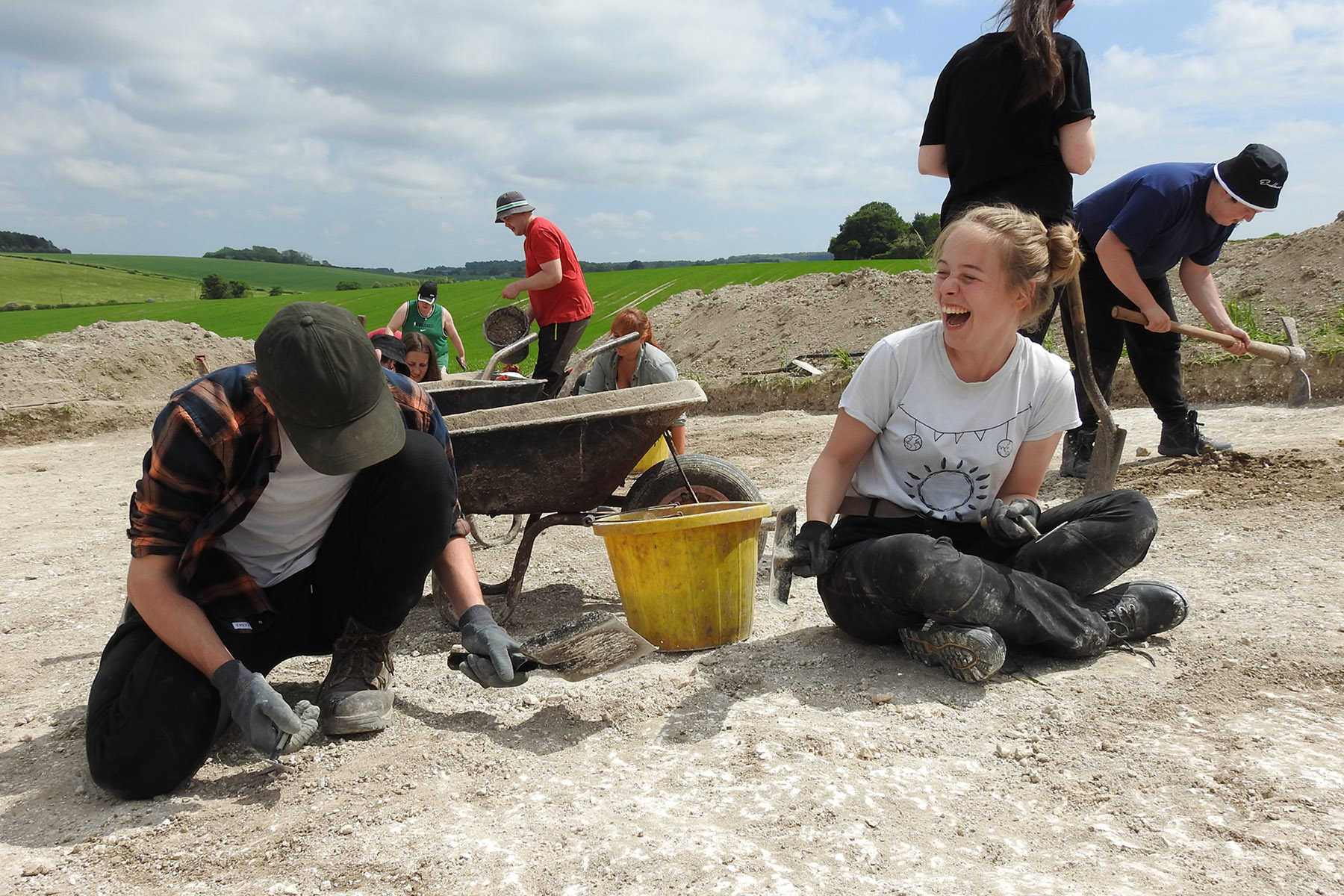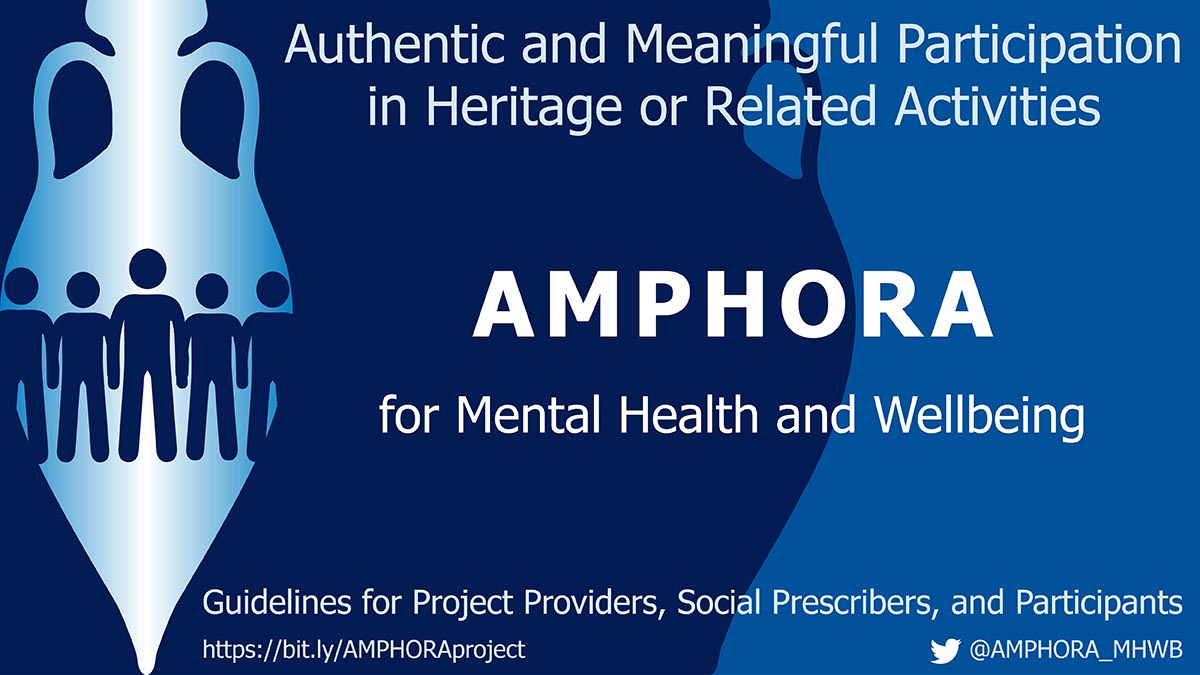AMPHORA project
Exploring the health and wellbeing benefits of participation in archaeology and heritage-related activities

Background
Archaeology, heritage, and the historic environment more broadly, are increasingly recognised as powerful non-medical tools in the delivery of benefits for community mental health and wellbeing. Archaeology as a therapeutic intervention for veterans achieved significant public profile through the work of Operation Nightingale from 2011, and the first large-scale study of psychological results from veterans participating on archaeological excavation (Everill, Bennett, and Burnell 2020) demonstrates clear decreases in the severity of the symptoms of depression and anxiety, and of feelings of isolation and lack of self-worth, along with an increase in mental wellbeing and sense of value.
The Heritage for Heroes initiative, established in 2016 at the University of Winchester by archaeologist Dr Paul Everill, saw fee-waiver studentships in archaeology for wounded veterans, and Georgian and Ukrainian veterans working alongside British archaeology students through the Anglo-Georgian Expedition to Nokalakevi.
The AMPHORA project
Building on the encouraging findings from the abovementioned initiatives, Dr Paul Everill teamed up with Dr Karen Burnell, Associate Professor of Applied Psychology at Solent University, and embarked on innovative interdisciplinary research, termed AMPHORA (Authentic and Meaningful Participation in Heritage Or Related Activities).
It began with an initial 2019 grant from the UKRI-funded MARCH Network to hold a ‘sandpit’ event on the subject of archaeology and heritage-based interventions to support mental health in February 2020. The discussion brought together a range of stakeholders, including service providers, heritage professionals, mental health professionals, representatives from local government, social prescribers and, crucially, beneficiaries as experts through lived experience. Among the results of that day-long workshop was the expression of support for a set of best-practice guidelines, to ensure that potential beneficiaries of new initiatives would be fully supported - and the best possible outcome achieved for them - and that the expertise of those working in the historic environment and those working in mental health would be embedded in the project.
Building on this, a much larger grant from the MARCH Network supported a nine-month Delphi consultation in 2021, with a significantly expanded stakeholder panel, through which a consensus view of the key elements was achieved over three rounds of questionnaires and feedback. The AMPHORA guidelines produced through the consultation are intended to:
- help service providers to better understand and address their responsibilities;
- help social prescribers/link workers to gauge the quality of support that should be offered to individuals they might be considering referring to heritage-based therapeutic services;
- give potential participants a better understanding of what they might expect in terms of support.
The intention is that by following the guidance in AMPHORA, projects can demonstrate that they are following best practice and that the logo can be used as a form of quality assurance. This means that potential participants, social prescribers/link workers, and funding bodies can also be reassured that projects are fully able to provide the best possible outcomes for both the participants and the historic environment. AMPHORA is designed to unlock the full therapeutic potential of heritage-based activities, allowing participants to contribute fully to projects which, in turn, are able to provide the right support and safeguarding.
The collaboration between Drs Everill and Burnell has also resulted in the publication of the co-edited volume Archaeology, Heritage, and Wellbeing (Everill and Burnell 2022), which includes a range of different perspectives that highlight the many ways in which the historic environment can support mental health/wellbeing, including among indigenous and marginalised communities.
The guidelines
The three AMPHORA guidelines, or ‘toolkits’, can be downloaded via Solent University's AMPHORA project website, which also hosts a checklist for project providers to support their decision making. The researchers are keen to hear from organisations that adopt and implement the AMPHORA guidelines for their projects.
Postgraduate research
Under the supervision of Dr Everill, research student Giselle Kiraly is undertaking doctoral research on the role of archaeological human remains as a potential facilitator for improved wellbeing, and Zoe Umpleby is currently assessing the impact of museums and cultural heritage on the rehabilitation process of military personnel and veterans recovering from trauma.
Contact the research team
Dr Paul Everill, Reader in Archaeology, University of Winchester
Dr Karen Burnell, Associate Professor of Applied Psychology, Solent University
Publications
Everill, P. and Burnell, K. (eds) 2022. Archaeology, Heritage and Wellbeing: Authentic, Powerful and Therapeutic Engagement with the Past (Taylor & Francis Ltd)
Public Engagement
Events
On 5 July 2024, Dr Paul Everill will be a keynote speaker at the event Using Archaeology for Recovery, a Seminar/Training Day organised by Bournemouth University. Speakers with experience of running projects that assist those who have suffered from trauma, especially on the battlefield, will share their knowledge with those who wish to run similar projects. Find out more and book your place.
Media
'Soldiers dig deep to defeat their demons', The Times, Monday 23 March 2020
Funding
- Society of Antiquaries of London, 2019
- Solent University, 2019
- MARCH network, 2019 and 2020
Background image: students digging at the Nokalakevi archaeological site in western Georgia. Visit the Nokalakevi project page to find out more.

